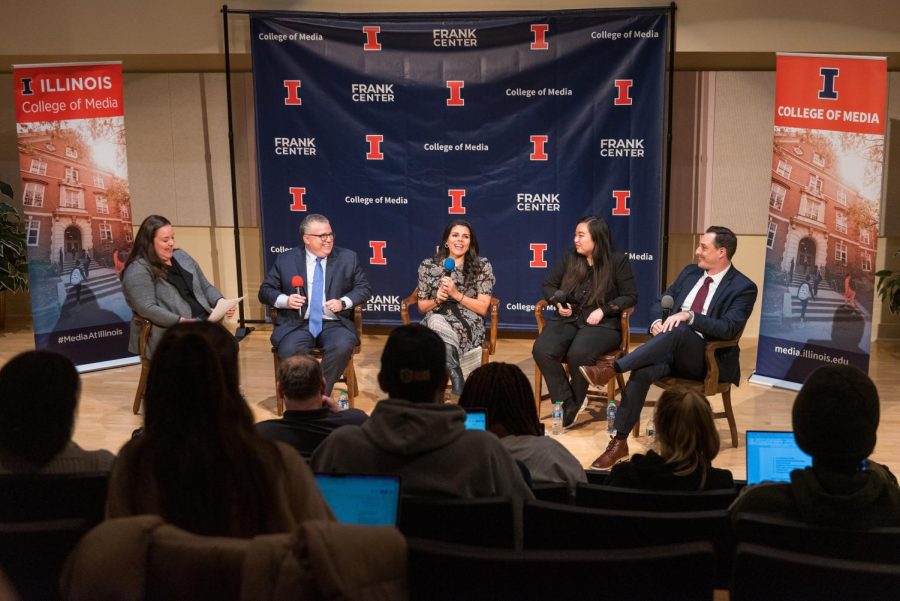Political journalists visit University to speak on upcoming elections
David Chalian, Domenico Montanaro, Vivian Salama and Alice Yin speak at a panel, “Reporting on Politics And Election,” in the Knight Auditorium in the Spurlock Museum on Thursday.
Oct 15, 2022
With the midterm elections coming up, the Richard and Leslie Frank Center in collaboration with the College of Media hosted a panel titled “Reporting on Politics And Election” on Thursday evening.
The panelists were David Chalian, a CNN Political Director, Domenico Montanaro, NPR’s Senior Political Editor, Vivian Salama, a Wall Street Journal National Security Reporter and Alice Yin, a Chicago Tribune City Hall Reporter.
The panelists were chosen to show the best of the different mediums of journalism, such as radio, print and TV.
Each panelist sat together on the stage and answered a series of questions from the event’s moderator Colleen King. King is the director of the Richard and Leslie Frank Center for Leadership and Innovation in Media and a clinical assistant professor in Media.
“I have prepared questions for (news) anchors for more than 15 years now,” King said. “Part of my job and my past life was being up to date on all things, politics and current events. So for most of my career, I was preparing things like that for (TV).”
Get The Daily Illini in your inbox!
The speakers talked about several issues, including the war in Ukraine, which Salama got to witness and report on from the front lines.
“We were getting woken up multiple times at night by explosions,” Salama said. “We haven’t seen a war like this since World War I. I feel for those guys on the frontline.”
Salama also noted the importance of voters being well-informed about political issues. In the case of the war, Salama said understanding the mechanics of the United States’ support is essential, as Ukraine heavily depends on it.
“There are lawmakers that say, ‘It’s really hard for me to go back and talk to my constituents who can’t afford gas and tell them we’re sending billions and billions of dollars to Ukraine,’” Salama said. “It’s important to understand that the pot of money for Ukraine is very different from the pot of money for any kind of economic stimulus or domestic needs.”
Another topic discussed was polling data. As someone who runs a polling desk, Chalian advised not to depend solely on polling data to make political decisions or for reporting news, a sentiment which was echoed by the other panelists, including Montanaro.
“I think it’s important to look at polls over time and see if things are headed in what direction,” Montanaro said. “The problem is, not all survey methods are conducted well. People just pay attention to the highlights of the horse race, as opposed to digging in.”
Another trend Chalian discusses was that while political activism is often correlated with the younger generation, the reality proves otherwise. Chalian said there is still so much room for the younger generation to participate in elections.
“The youth vote is something that is looked at all the time because there can be a lot of energy around young people,” Chalian said. “Yet, we’ve seen many, many election cycles where young people don’t show up in the numbers.”
Audience member Luca Iasinschi, freshman in LAS, attended the panel to see politics in action.
“I thought it would be an interesting opportunity,” Iasinchi said. “I’d like to understand my (political science) major. I try to go to as many meetings as possible to meet different professionals to figure out what I want to do.”
King said that she and the panelists were happy with the amount of audience participation.
“Our guests were so impressed by the level of engagement from the students throughout the day in class and in meetings,” King said. “The panelists all remarked about how great the questions were from students throughout the day and how happy they were to see how engaged the Illinois student community was regarding this event.”
The panelists also visited classes throughout the day. Chalian and Yin went to JOUR 200: Introduction to Journalism, taught by professor Chris Evans, and Montanaro attended an audio journalism class taught by professor Charles “Stretch” Ledford. Montanaro, Chalian and Yin also attended lunch with several journalism students at the Illini Union on Friday.
Chalian said he sees journalism as an important platform for encouraging political participation.
“(Journalism) is a high and honorable profession, even in a constantly changing media landscape,” Chalian said. “You have this incredible platform to be able to inform Americans about their choices for political leadership.”






